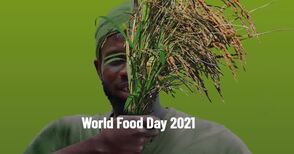 PHOTO:©Sadek Ahmed PHOTO:©Sadek Ahmed Almost half of the world’s people live on less than two dollars a day. But more than one billion people – about a fifth of the earth’s population – subsist in extreme poverty, living on less than a dollar a day. Because of those tragic facts, this week people around the world will observe two important U.N.-designated days – United Nations World Food Day on October 16th; and the International Day for the Eradication of Poverty on October 17th. These two observances recognize the critical importance of lifting the severe burdens of hunger and extreme poverty: If we are to realize the future we want for all, we must hear and heed the calls of the marginalized… Together, we can build a sustainable world of prosperity and peace, justice and equity – a life of dignity for all. – U.N. Secretary-General Ban Ki-moon.  World Food Day 2021 World Food Day 2021 This persistent problem of extreme poverty affects all of us. Beyond the obvious human suffering it causes, extreme poverty has an enormous material and spiritual impact on every person, rich or poor, wherever they live in the world. When one in five human beings lives in extreme poverty, their economic conditions continually exert downward pressure on the world’s financial indexes. Their unmet food, shelter and healthcare needs mean we lose their unrealized talents and potential contributions to humanity. And the Baha’i writings describe the spiritual effect of tolerating such extreme privation in our midst: Although the body politic is one family yet because of lack of harmonious relations some members are comfortable and some in direst misery, some members are satisfied and some are hungry, some members are clothed in most costly garments and some families are in need of food and shelter. Why? Because this family lacks the necessary reciprocity and symmetry. This household is not well arranged. This household is not living under a perfect law. All the laws which are legislated do not ensure happiness. They do not provide comfort. Therefore a law must be given to this family by means of which all the members of this family will enjoy equal well-being and happiness. Baha’is believe that hunger and extreme poverty do not have to continue in the world. Baha’u’llah based the teachings of the Baha’i Faith on justice as the ruling principle in human society, and the Baha’i writings spell out clearly how that sense of justice and fairness for all can be codified into laws that protect the most vulnerable: Each one of you must have great consideration for the poor and render them assistance. Organize in an effort to help them and prevent increase of poverty. The greatest means for prevention is that whereby the laws of the community will be so framed and enacted that it will not be possible for a few to be millionaires and many destitute. One of Baha’u’llah’s teachings is the adjustment of means of livelihood in human society. Under this adjustment there can be no extremes in human conditions as regards wealth and sustenance. – Abdu’l-Baha, Foundations of World Unity Does this mean that Baha’is advocate socialism, an economic system that forces a large tax burden on the wealthy? Eradication of Poverty Day: Sharing Wealth the Baha’i Way Abdu’l-Baha explains: Baha’is envision and diligently work toward a future state of society where love outweighs materialism; where selfless concern for others trumps individual selfishness; where we treat all humanity with the same care and consideration we give to the members of our own family. In fact, Baha’is believe we are all one family – a human family that extends to every person on earth. The essential unity of humanity, the Baha’i writings say, makes us all the branches, leaves, flowers and fruits of one tree. This powerful theology of oneness and reciprocity means that Baha’is advocate voluntary giving, not involuntary taxation: Hearts must be so cemented together, love must become so dominant that the rich shall most willingly extend assistance to the poor and take steps to establish these economic adjustments permanently. If it is accomplished in this way, it will be most praiseworthy because then it will be for the sake of God and in the pathway of His service. For example, it will be as if the rich inhabitants of a city should say, “It is neither just nor lawful that we should possess great wealth while there is abject poverty in this community,” and then willingly give their wealth to the poor, retaining only as much as will enable them to live comfortably. – Abdu’l-Baha, The Promulgation of Universal Peace Happily, in the one-hundred-plus years since Abdu’l-Baha first told Western audiences about the Baha’i teachings and their spiritual solutions to the world’s economic problems, this principle of voluntary and willing assistance has begun to flower around the globe, and its unprecedented impacts have made history. Wealthy governments and individuals donate large amounts to benefit poor nations and peoples. Billionaires have pledged to give away the bulk of their wealth to benefit the poor. Campaigns conducted by celebrities and regular people and the UN and many other international groups have dramatically reduced the foreign debt poor countries face, raising the standard of living for all of their citizens. Wealthy countries have willingly proposed and passed progressive taxation laws. Massive voluntary foreign aid from countries and NGOs continues to flow to the poorest countries and peoples. And maybe most importantly, a huge contingent of motivated, selfless and altruistic world citizens has arisen to serve others, dedicating their lives to improving the conditions that afflict extremely poor people. As a result of all this tremendous movement, in the past twenty years the world has actually reduced its extremely poor population by half. This enormous accomplishment, never before attempted in human history, proves Abdu’l-Baha’s point — that a united humanity can eradicate hunger and extreme poverty. Much work remains. But at this rate, we could completely eliminate extreme poverty in the next few decades. Can you imagine what an incredible human achievement that would represent? It can happen, if we each resolve to think and act in ways that prove all of us belong to one human family. Be ye as the fingers of one hand, the members of one body. - Baha’u’llah |
Bahá’ís of BotswanaBahá’í communities are working together with their neighbours and friends to promote and contribute to the well-being and progress of society. In urban centres and rural villages, in homes and schools, citizens of all backgrounds, classes and ages are participating in a dynamic pattern of life, taking part in activities which are, at once, spiritual, social and educational. Archives
January 2023
Categories |
FOR MORE INFORMATION
|
|

 RSS Feed
RSS Feed